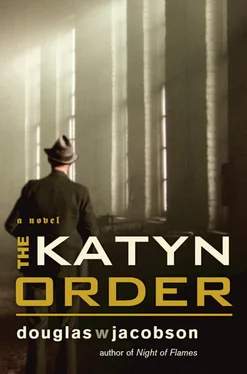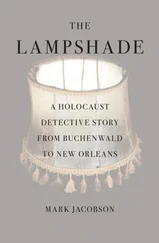Adam braced himself against one of the rough, wooden posts—the remains of a pier long since vanished—and stared in the direction where he’d last seen the flash. The spray soaked him instantly, the chill of the piercing wind driving straight through to his bones. Within minutes he was freezing and felt dizzy. The occasional dizzy spells were another result of the bullet wound last September. He’d had his thirty-fourth birthday two weeks ago, but on nights like this he felt twice his age. He clung tight to the post, shivering and waiting for the dizziness to pass.
He saw it again. Another flash.
What did the message say? Three quick flashes? Answer with two flashes?
Adam reached into his pocket for the flashlight he’d taken from the AK safe house. His hand trembled from the cold as he held it and fumbled for the switch. He flicked it on and off twice, wondering if it were strong enough.
Then he glanced back at the bluff again. Goddamn it!
Headlights bounced along the coast road.
He turned back toward the sea and was startled when he saw the light almost on top of him. Then, out of the gloom, the shape of a boat appeared, its rounded bow rising and falling in the surf. He flicked the flashlight again, twice, as the boat swept ashore.
Two figures emerged, one holding a line, the other racing toward him. He was a large, husky man, wearing a black rubber suit, his pistol drawn. He shouted in English, “We are looking for Oskar!” The voice was deep and strong, the accent British, the words expected.
Adam shouted back, “Oskar has taken the train.”
A gunshot from the bluff—
The British marine fired back—
Then he grabbed Adam’s arm. “Let’s get out of here, chum. You’re off to London.”
10 MAY
THE HOTEL ROOM in London was small but clean, with fresh sheets and a private bath. There were clean clothes in the bureau, a new suit in the closet and room service. Adam thought he’d died and gone to heaven.
The first day after his arrival, he had stumbled about in a fog. The entire journey seemed surreal, like something he might expect to see in the cinema—tough men in a rubber raft, a submarine, a small twin-engine plane. He’d been whisked to the hotel in a limousine with instructions to get some sleep and, in no uncertain terms, to stay put.
By the afternoon of the second day, Adam was restless. He wore clean clothes for the first time in many months. The food was good, the best he’d had in years, and more than he could possibly eat. Apparently his hosts had special connections. He couldn’t imagine that even Londoners ate this good in wartime.
The bed was firm—a real bed with real sheets and pillows—though he still woke abruptly in the middle of the night, as he’d done almost every night since Warsaw. He would stare into the darkness, hands trembling, his back clammy with sweat. The dream varied little from one restless night to the next, though the faces would change—dead faces, their eyes wide open, staring back at him.
The proprietor of the hotel, a proper sort in a tweed jacket, pipe clenched in his teeth, had delivered the London Times to his room. The paper was still overflowing with news and pictures of V-E Day celebrations. Adam read it all, from front to back, scarcely able to believe the war had officially ended. It certainly hadn’t for the Russians, hunting down the AK in Poland.
Finally, at four o’clock in the afternoon, there was a knock on the door. It was the chauffer, the same one who’d driven him to the hotel without speaking. This afternoon he said, “You have an appointment.” That was all.
As the sleek, black Bentley dodged between black taxis and double-decker buses in the congested streets of London, Adam observed the condition of the city. He had left London in 1940, before the worst of the Blitz, but he had heard the reports about nonstop bombing raids. He noticed that part of the British Museum had been destroyed, several tube stations reduced to craters and the Commons Chamber of Parliament badly damaged. A number of windows were boarded up at Buckingham Palace, but Big Ben and Westminster Abbey still stood. Compared to Warsaw, London seemed virtually untouched.
The Bentley pulled into a garage underneath a familiar office building on Baker Street. The chauffer opened the rear door and handed Adam off to a pretty young woman, who introduced herself as Margie, Colonel Whitehall’s assistant.
They took the elevator to the fifth floor and walked down the same drab hallway he remembered from his previous visits. At the end of the hall, he was ushered into the same cluttered office he recalled, with two large windows overlooking an interior courtyard. A heavyset man with a pink, fleshy face and a shock of unruly white hair hoisted himself from his chair and stepped around the desk, hand outstretched.
“Adam, jolly good to see you again. What’s it been, three years, four? Have a seat.”
“Almost five,” Adam said as he shook Whitehall’s thick hand and sat down on the straight-backed chair in front of the large wooden desk covered with an array of file folders. Whitehall shuffled back around the desk and plopped heavily into the chair. He seemed much older.
“Had a nice rest?” Whitehall asked, rummaging through the folders. “It was fine.” Adam watched the colonel curiously, wondering what the old man had in store for him this time. As one of the founders of SOE—the Special Operations Executive—Whitehall was a shrewd old war horse appointed by Churchill himself with orders to “set Europe ablaze.”
They’d certainly accomplished that, Adam thought grimly. He’d left behind more than enough corpses to attest to it.
Whitehall found the file he was looking for, flipped through a few papers, then leaned forward, peering over the top of his reading glasses. “Can you guess why you’re here?”
It was the type of mind game Whitehall loved, but Adam had little patience for it. Not now. Not after Warsaw. SOE had financed and directed hundreds of sabotage and covert resistance operations throughout the war but, like everyone else, they had looked the other way when Warsaw was leveled. Now the Germans were gone, and the Russians had moved into Poland—different enemy, equally dangerous. “No, Colonel, I really have no idea,” he said.
Whitehall grunted, removed a sheet of paper from the file and passed it across the desk. Adam picked it up and read the single paragraph.
Sachsenhausen prison camp at Oranienburg, Germany, liberated 22 April, 1945, by Soviet Red Army. Less than 3,000 survivors including, 1,400 women. Most starving and too weak for transport to medical facilities.
“If I remember correctly, that’s where Ludwik Banach was sent after he was arrested by the Gestapo in 1939,” Whitehall said.
Ludwik Banach. Hearing his uncle’s name so abruptly after all these years took Adam’s breath away. After a moment he looked at Whitehall, nodding slowly.
Whitehall opened another folder. “A war crimes investigation team is being sent to Berlin to negotiate with the Russians. They want to get into Sachsenhausen as soon as possible. The Americans are taking the lead, along with some of our boys, but the Polish Government-in-Exile here in London wants a representative on the team. I’ve recommended you.”
Adam had been struggling to follow what Whitehall was saying, suddenly consumed with thoughts of his uncle. “I’m sorry… I don’t understand. You want me to join a war crimes investigation team… representing the Polish Government?”
Whitehall lifted his bulky body out of the chair, lumbered across the room and closed the door. When he sat down again, he took back the sheet of paper and closed the file. “Your uncle, Ludwik Banach, was one of the original founders of the AK. He was known under a code name—the Provider—and he set up an information channel several months before the war broke out to smuggle secret German documents to Warsaw, which were, in turn, passed on to us here in London.”
Читать дальше












